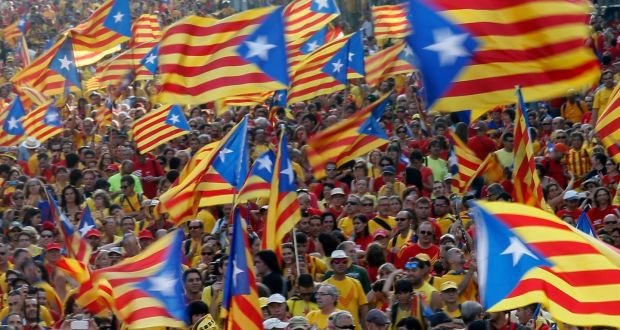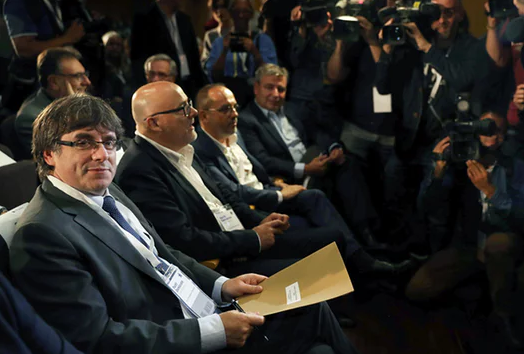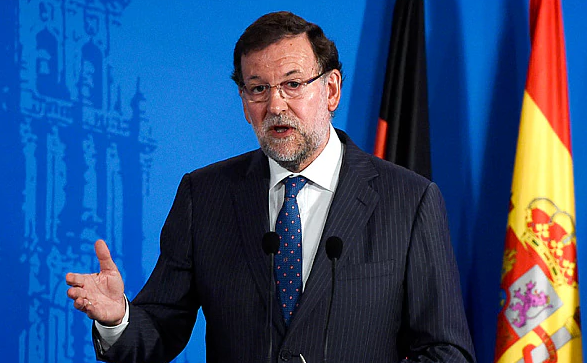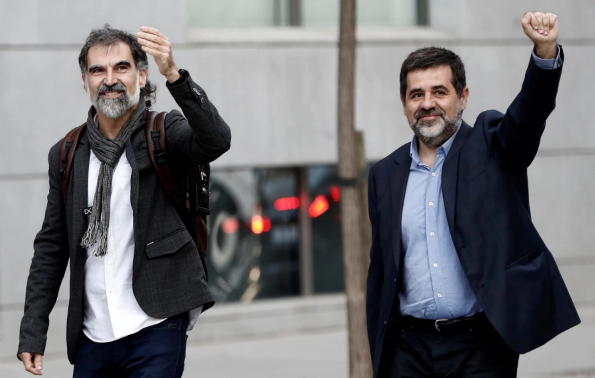🌍 Why do Catalonians are in favor of an independent state?
Catalonia is a region in Spain's northeast with Barcelona as the capital. For the "patriots," the fight for freedom has been a three-century project, one that can be traced back to 1714, when Philip V of Spain captured Barcelona, even today Spanish loyalists are nicknamed as "botiflers" or allies of Philip V. Since then, Catalan nationalists have consistently pursued some degree of autonomy from Spain.
The Catalan independence movement began in 1922 when Francesc Macià founded Estat Català. Francesc Macià after winning the election in 1931 accepted autonomy of Catalonia within the Spanish state instead of demanding a separate nation. By 1932, the region's leaders had declared a Catalan Republic, and the Spanish government agreed to their terms. From 1938 till 1975 during the Spanish Civil War under the rule of diktat General Francisco Franco Catalan autonomy was abolished only after his death in 1975 political parties in Catalonia region concentrated their efforts on autonomy rather than independence. Till here everything was calm.

Catalonia 20% of Spain's Economy 16% of its population
Catalonia richest region in Spain and highly industrialized
"Many Catalans have grown to adulthood believing that they were, simply, not Spanish."
What incident led to the Spain-Catalonia Dispute?
The modern independence movement began when the 2006 Statute of Autonomy - a document that lists Catalonia's basic institutional regulations under the Spanish Constitution of 1978, It defines the rights and obligations of the citizens of Catalonia, which had been agreed with the Spanish government and passed by a referendum in Catalonia, this document was challenged in the Spanish High Court of Justice, which ruled that some articles were unconstitutional and require restriction in their interpretation. This restriction on enjoyed privileges resulted in protest among the advocates of Catalonian autonomy.
Catalonia demarcated in the map of Spain

Catalonia is a Spanish autonomous region with a high-level of self-government. Over 550 municipalities in Catalonia held symbolic referendums on independence between 2009 and 2011, all of them returning a high "yes" vote, with a turnout of around 30% of those eligible to vote.
How did things unfolded and who were the people involved?
Arthur Mas 129th President of Catalonia

Arthur Mas called a snap general election on 25 November 2012, which resulted in a pro-independence majority for the first time in the region's history. The new parliament adopted Declaration on the Sovereignty and Rights of the People of Catalonia on 23 January 2013. The Catalan government announced a referendum, to be held in November 2014, on the question of statehood. "Do you want Catalonia to become a State?" and (if yes) "Do you want this State to be independent?". The Spanish court banned such a prospect, even after the ban the non-abiding-referendum was carried out on 9 November 2014.
Carles Puigdemont 130th President of Catalonia

On 10 January 2016, he was elected as the 130th president of Catalonia by the Parliament. Catalonia referendum took place on 1st October 2017 the vote went ahead , even as police used violence to try and enforce a court order against it. Regional officials say more than 40 per cent of Catalonia's 5.5 million eligible voters cast ballots and that the vote went 90 per cent in favor of independence. The exchange of letters between the Catalan leader, Carles Puigdemont, and Spain’s prime minister, Mariano Rajoy, has proven to be sterile. On the one hand, there is the prospect of a vote in parliament for a "unilateral declaration of independence" and on the other hand there is the menace of superimposition of Spanish rule on Catalonia.
Puigdemont wrote that "fundamental rights are being repressed", with bank accounts frozen, media censorship, private mail being interfered with, civil servants arrested and "brutal violent acts carried out by police against peaceful citizens on 1 October."
"Our call for dialogue is sincere, despite everything that has occurred, but it obviously incompatible with the current climate of escalating oppression and threats,"
"Despite all our efforts and our will for dialogue, the fact that your only answer is canceling our autonomy indicates that that you do not understand the problem and do not wish to talk,"
Mariano Rajoy Prime Minister of Spain since 2011

After an emergency cabinet meeting, and citing the Catalan government’s "conscious and systematic rebellion and disobedience", Spain’s prime minister, Mariano Rajoy, said he was invoking article 155 of the constitution to "restore the rule of law, coexistence, the economic recovery and so that elections could be held in normal circumstances". The measures must now be approved by Spain's upper house, the Senate, where a vote is scheduled for 27th October.
Jordi Cuixart and Jordi Sanchez arrested leaders - Credit: Getty Images

European officials have expressed firm support for the Spanish central government. A European Union official said that people should respect the constitution and rule of law in their respective countries. But E.U. officials also say they will not mediate between the dispute of Spain and Catalonia, calling it their internal matter.
Populism Sentiments by - Francesc Badia i Dalmases, Opendemocracy, The Guardian
Populism proposes simple solutions to complex problems. Pro-independence leaders create narratives based on historical grievances, and seem trapped in denial of reality and facts. Their reality includes strong opposition from the governing authorities, banks and corporations.
For many years, independence in Catalonia has been portrayed as a happy, low-cost and easy path devoid of obstacles to a better world. People were made to believe a land of a richer, freer state that would enjoy grande welfare and be admired in the world.
Much as for the Brexiteers, and supporters of Donald Trump who believed in their leader’s promises, the reality is proving just how illusory the pursued idea was. In Catalonia, as events unfold rapidly, people have started to realize that the road to independence is a harsh terrain and at the end of the day, it might turn out to be simply unrealistic.
Politicians are there to solve old problems, not to create new ones. Inaction on the side of the Spanish government (concerned only with making sure the economy picks up, and with its own political survival) and a ramping up on the side of the Catalan administration (focused only on delivering their particular road map to improbable independence) have left the country in tatters.
King Felipe VI addressing the nation on unity of Spain and disallowing secession of Catalonia
 "/>
"/>Could Catalonia make a success of independence? -BBC News
The cause of a greater concern is Catalonia's debt that stands at €77bn (£68bn) at the last count, or 35.4% of Catalonia's GDP. Out of the total owed sum, €52bn is owed to the Spanish government.
"In 2012, the Spanish government set up a special fund to provide cash to the regions, who were unable to borrow money on the international markets after the financial crisis. Catalonia has been by far the biggest beneficiary of this scheme, taking €67bn since it began".
Not only would Catalonia lose access to that scheme, but it would raise the question of how much debt Catalonia would be willing to repay after independence.
That question would surely cast a shadow over any negotiations. Adding to that what if Madrid ask Barcelona to shoulder a share of the Spanish national debt. These questions will only be answered when a definite stance or position on a decision is assumed by the leaders involved.
Why does Catalonia want independence?
What's happening in Spain and how did we get here?
The Last piece of suggestion to all the Catalonians
There is a very interesting novel called "The Animal Farm" written by - George Orwell . Please go through it once before following any leader and thoroughly analyse their statements.
Sources: The Guardian ▶ Ny Times ▶ Wikipedia ▶ CNN ▶ The Independent ▶ RTE ▶ Washington Post ▶ Telegraph ▶ Open Democracy ▶ BBC
This post is great but the spanish tag should be used only when the post is written in spanish, avoid using this tag if your post is not in spanish.
Please do not keep using this tag if you don´t write in spanish or we will be forced to flag your content.
Recomendación, usa el tag spanish cuando el contenido sea escrito de manera parcial o total en español para evitar publicar contenido clasificado como plagio o abuso en el futuro.
Steemit es una plataforma en la que se recompensa el trabajo original y propio. Si existe alguna duda sobre cómo puedes evitar el plagio y abuso favor de leer las publicaciones informativas de @lince.
Para cualquier aclaración los medios de comunicación son por correo a lince.steemit@gmail.com o en los chats de discord y steemit.chat
I will take your suggestion about the language tag into account. Thanks for pointing that out.
Te doy la bienvenida a Steemit, @digitalfortress
A continuación te presento varias iniciativas que existen en esta comunidad para ayudarte a crecer
Para ayudarte en la plataforma, he votado en este post y te estoy siguiendo 🙂
Si tienes alguna duda o pregunta, te invito a que participes en el post semanal de @preguntame en donde te contestamos todas tus preguntas.
¡Te deseamos mucho éxito y que disfrutes estar por aquí!
Este bot fue creado por @moisesmcardona. Vótalo como Witness si esta información te ha parecido útil en https://steemit.com/~witnesses
Your post r very good and show a good effort. So I appreciate your working. It may inspaire many other. Like it inspires me.I have blog regarding fun elements, can you plz do a visit to my post. And upvote them which u like and if u like the content then plz do follow me friend. Actually I need your support .